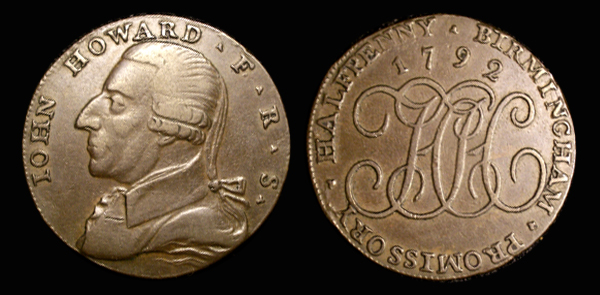
HALF PENNY TOKEN - WARWICKSHIRE - JOHN HOWARD
(D&H 145)
Date: A.D. 1792
Obverse: Portrait facing left - IOHN HOWARD F R S (Fellowship of the Royal Society)
Reverse: HH - HALFPENNY BIRMINGHAM PROMISSORY 1792
|
Warwickshire D & H 145 Half Penny Depicting John Howard / Payable at H. Hickmans Warehouse Birmingham Issued by Henry Hickman / wholesale and retail dealer in Iron In the late 1600's to the late 1700's copper coinage was produced sporadically, sometimes not at all, for various reasons. Conder Tokens (named after James Conder) are copper coins (usually pennies and half pennies) Printed by towns, businesses, and organizations of all types to meet a need for low denomination coinage to pay wages and make change. Thousands of varieties of tokens were minted and many are beautiful and intricate. About John Howard: John Howard was born in Lower Clapton London the son of a wealthy upholsterer. His mother died when he was very young and after his father died the young John Howard, a rather strict Calvinist, found himself without vocational training, a disdain for the the English aristocratic lifestyle, and little direction. He began to travel and while in Hanover he was captured by French privateers and imprisoned. It was this experience that made him consider the conditions in which prisoners were held. In 1758 Howard returned to England and settled in Cardington, Bedfordshire. As a landowner he was philanthropic and enlightened, ensuring that his estate housing was of good standard and that the poor houses under his management were well run. In 1773 he became High Sheriff of Bedfordshire. On his appointment he began a tour of English prisons which led to two Acts of Parliament in 1774, making gaolers salaried officers and setting standards of cleanliness. Howard also toured European prisons and published 'State of the Prisons in England and Wales, with an account of some Foreign Prisons' (1777). Howard died of fever while visiting Russian military hospitals at Kherson in the Crimea. Howard's work is continued today by the Howard League for Penal Reform. |

